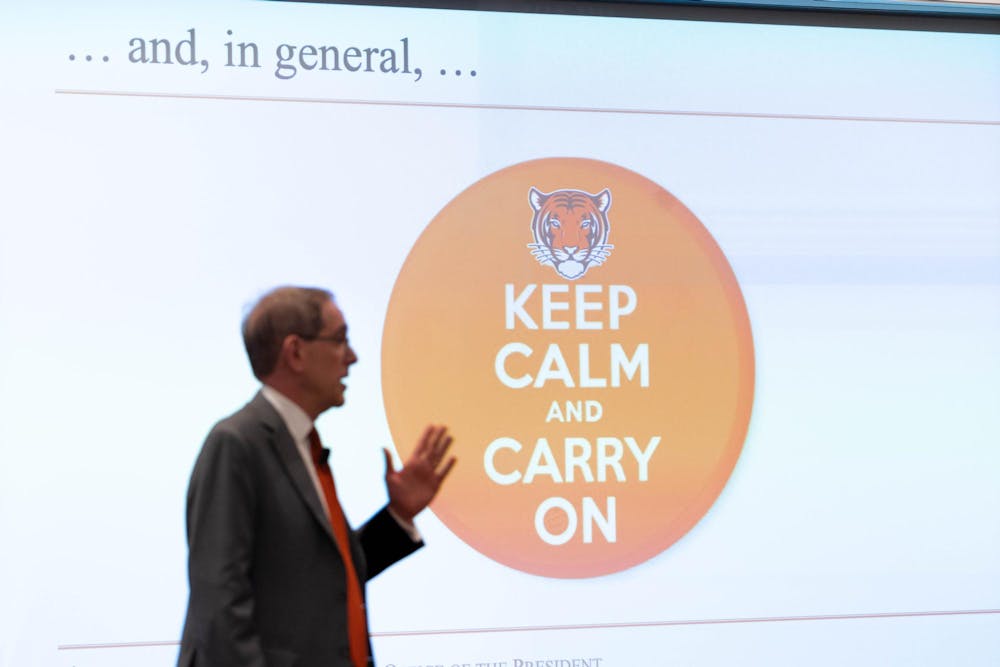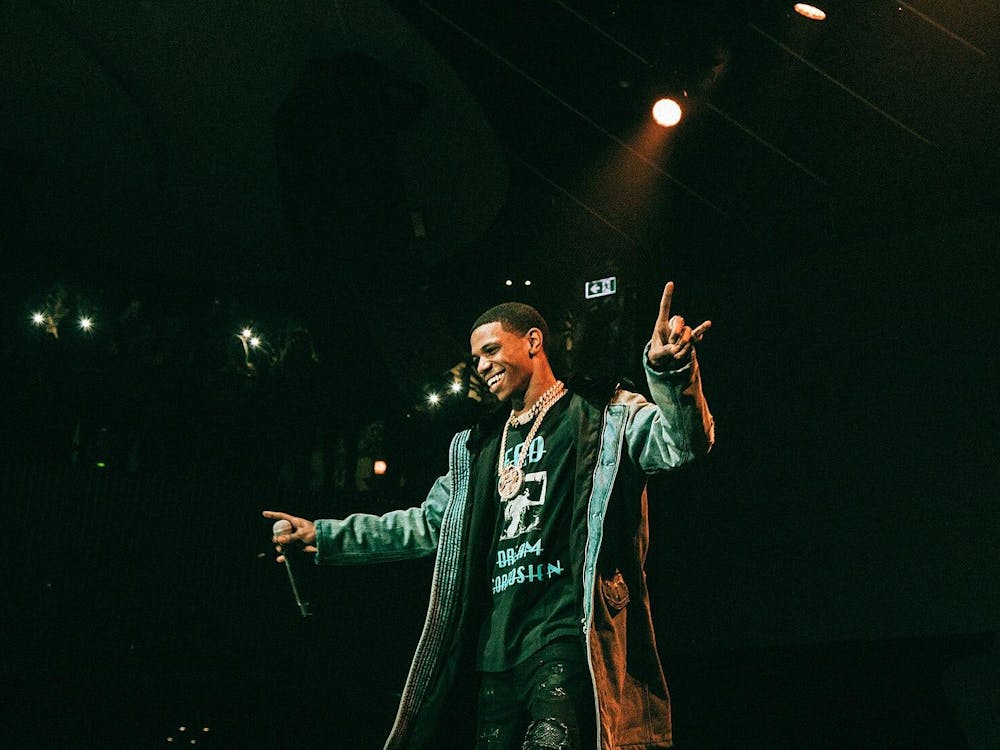University President Christopher Eisgruber ’83 advised the campus community to “Keep Calm and Carry On” and offered other World War II-era words of advice at the Council of the Princeton University Committee (CPUC) meeting on Monday, as the University grapples with challenges posed by the Trump administration.
During the meeting, Eisgruber broadly reiterated main points from his annual letter to the community, and he took questions from the audience at the end. Representing the faculty, the undergraduate and graduate populations, and staff, 33 of 52 members of the Executive Committee of the CPUC were present. Around 80 people attended the meeting in the Frist B-level multipurpose room.
Eisgruber outlined the University’s philosophy for responding to executive orders that may affect campus.
“I said in the course of the annual letter that I wanted to concentrate on strategic issues that are longer term for us, rather than trying to respond directly to the orders that are coming out of Washington,” said Eisgruber in his opening remarks.
He explained that rather than updating each change as it comes, the administration will choose to wait until executive orders and their legal status are clear to update the campus community.
“We will communicate about them when we have things to share, and we’ll often do that by creating FAQs,” said Eisgruber.
The website for the Office of the Dean of Research, for example, was updated over the weekend to provide guidance on a National Institutes of Health (NIH) order that capped the indirect cost recoveries on research grants at 15 percent. Eisgruber explained that these costs are often facilities and administrative costs, which are “real costs of doing research.” This slash to NIH costs will have a significant impact on universities around the country that house opportunities for research.
“For all of the universities that perform research around the country, these kinds of orders that are coming out of Washington do pose serious risks to their budget model and to the ability to proceed forward with the research that we are doing,” said Eisgruber.
To illustrate the University’s policy regarding executive orders, Eisgruber introduced an unofficial motto: “Keep Calm and Carry On.” The slideshow presentation featured a graphic with a tiger above the motto.
Eisgruber explained the motto “didn’t mean be oblivious or pretend there’s nothing of concern happening or just go about ordinary life. It meant press forward with our mission, but keep calm and move forward.”
Another slide, titled “More crisis management advice from WW2 Britain,” re-emphasized the phrase alongside two others: “Freedom is in peril, defend it with all your might” and “Your courage, your cheerfulness, your resolution will bring us victory.”
Next, Eisgruber reintroduced another motto he attributed to former Princeton president Bill Bowen ’58, “Princeton is always under construction.”

“In addition to being physically under construction, we’re always transforming ourselves in a push to make Princeton better than it has been in the past,” he continued.
He updated the community on the recent completion of the largest campus construction projects. He began by showing rendered images of the completed Art Museum, promising that its opening in October would be “an amazing event on this campus.”
Eisgruber also highlighted the completion of the Frist Health Center and the fitness center on the Meadows Campus.
Eisgruber continued to reiterate updates he shared in his annual letter to the community. He emphasized the importance of the endowment and explained how its sustainability is a lifeline for the University as it funds faculty salaries and research. He also emphasized his decision to publicize diversity and inclusion data and shared many graphs to visualize the demographic data during the meeting.
To conclude the first meeting of the spring semester, Eisgruber opened the meeting up to committee members for questions, then to audience members.
The last question of the meeting was asked by a student regarding the progress of the three referenda approved by undergraduates last fall. The referenda called for the University to divest from weapons manufacturers, improve employment standards for student workers, and to dissociate from certain fossil fuel companies.
“What steps will you take to implement these three [referenda] specifically, and on what timeline?” asked the student.
“The student referenda are part of something that the student government created. They’re not part of something that is a part of university administrative processes,” replied Eisgruber.
Seated in the audience were 10 pro-Palestine protestors, holding signs with phrases such as “Genocide,” “the Students have Spoken,” “I refuse to support a university that funds genocide and arrests its very own students for standing for human rights,” and “Pay Up, Princeton.” After this question, the meeting officially ended and the remaining pro-Palestine student protestors swiftly exited to join the ongoing protest on Frist North Lawn.
Cynthia Torres is an assistant News editor and an Archives contributor. She is from New Bedford, Mass. and typically covers University administration.
Luke Grippo is a staff News writer for the ‘Prince.’ He is from South Jersey and usually covers administrative issues, including USG, the CPUC, and institutional legacy, but loves to write in any area.
Please send any corrections to corrections[at]dailyprincetonian.com.








